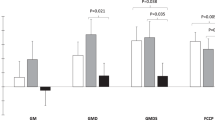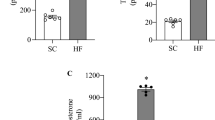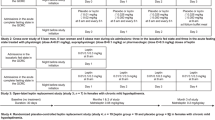Abstract
OBJECTIVE: To investigate the effects of leptin and the combination of insulin and leptin on glucose metabolism in incubated rat soleus muscle.
ANIMALS: Male lean albino rats (50–70 g) of the Wistar strain were used in all experiments.
MEASUREMENTS: 2-Deoxy-D-[3H]-glucose (2-DG) uptake, glycogen synthesis, lactate synthesis, glucose and pyruvate decarboxylation.
RESULTS: Leptin (1, 10 and 100 nM), increased 2-Deoxyglucose uptake from 4.07 ±0.23 μmol/h−1/g−1 (basal) to 5.88±:0.29 ±mol/h−1/g−1 (100 nM) (P<0.05); however, leptin did not potentiate the effect of either physiological (100 μU/ml) or supra-physiological (10 000 μU/ml) insulin concentrations on glucose uptake. Glycogen synthesis rose almost 2-fold in the presence of supra-physiological leptin concentrations (100 nM). The combination of insulin and leptin did not present any additional effect on glycogen synthesis beyond that caused by insulin. Compared to the control group, the decarboxylation of [U-14C] D-glucose increased 75%, 246% and 304% (P<0.05) in the presence of 1, 10 and 100 nM leptin, respectively. When leptin (100 nM) was combined with insulin in the incubation medium, the 14CO2 production rose almost 4-fold (397%) (P<0.05) and more than 5-fold (527%) (P<0.05) for the 100 μU/ml and 10 000 μU/ml insulin concentrations, respectively. In the presence of leptin (100 nM), the decarboxylation of [1-14C]- and [2-14C]-pyruvate in incubated muscles rose 89% and 49%, respectively, indicating that both pyruvate dehydrogenase and Krebs cycle are activated by leptin.
CONCLUSION: These data demonstrate that, in soleus muscle, leptin per se exerts a direct and acute insulin-like effect, stimulating glucose uptake, glycogen synthesis, lactate formation and glucose oxidation.
This is a preview of subscription content, access via your institution
Access options
Subscribe to this journal
Receive 12 print issues and online access
$259.00 per year
only $21.58 per issue
Buy this article
- Purchase on Springer Link
- Instant access to full article PDF
Prices may be subject to local taxes which are calculated during checkout
Similar content being viewed by others
Author information
Authors and Affiliations
Rights and permissions
About this article
Cite this article
Ceddia, R., William, W. & Curi, R. Comparing effects of leptin and insulin on glucose metabolism in skeletal muscle: evidence for an effect of leptin on glucose uptake and decarboxylation. Int J Obes 23, 75–82 (1999). https://doi.org/10.1038/sj.ijo.0800762
Received:
Revised:
Accepted:
Published:
Issue Date:
DOI: https://doi.org/10.1038/sj.ijo.0800762
Keywords
This article is cited by
-
Leptin at gender-specific concentrations does not affect glucose transport, expression of glucose transporters and leptin receptors in human lymphocytes
Endocrine (2015)
-
Leptin intake during the suckling period improves the metabolic response of adipose tissue to a high-fat diet
International Journal of Obesity (2010)
-
A beta cell-specific knockout of hormone-sensitive lipase in mice results in hyperglycaemia and disruption of exocytosis
Diabetologia (2009)
-
Leptin prevents the metabolic effects of adiponectin in L6 myotubes
Diabetologia (2009)
-
High‐fat Diet‐induced Obesity Leads to Resistance to Leptin‐induced Cardiomyocyte Contractile Response
Obesity (2008)



